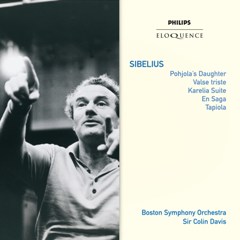Jean Sibelius - Tone Poems (1980)
Jean Sibelius - Tone Poems (1980)

1. Pohjola's Daughter, Op. 49 2. Valse triste, Op.44 3. Karelia Suite, Op.11 - I. Intermezzo 4. Karelia Suite, Op.11 - II. Ballade 5. Karelia Suite, Op.11 - III. Alla Marcia 6. En Saga, Op.9 7. Tapiola, Op.112 8. Lemminkäinen Suite Op.22, No.3 The Swan of Tuonela 9. Finlandia, tone poem for orchestra, Op.26 Boston Symphony Orchestra Sir Colin Davis - conductor
Colin Davis’ Sibelius is well-known and regarded but surprisingly some key Sibelius recordings of his with the Boston Symphony have never made it to CD. These include ‘Pohjola’s Daughter’ and ‘En saga’. His ‘Karelia Suite’ is rare at best. Together with Valse Triste’ and ‘Tapiola’, these make up an excellent disc of Sibelius Tone Poems. ---fishfinemusic.com.au
Sibelius is one of the great masters of the orchestra, and each of his orchestral compositions is thoroughly representative of his genius. Ample proof of this generalization can be found in this attractive Philips reissue of programme music, beautifully played by one of the world’s finest orchestras conducted by an important Sibelian: Sir Colin Davis.
The programme is thoughtfully put together to offer the option of a complete sequence or a track or two; for that is the nature of the music. The Philips recordings are more than twenty years old but they reflect the high standards of the period and they do not sound in the least dated. Take the opening of the first track, for instance. Pohjola’s Daughter begins with the dark sounds of lower strings. The Boston players bring a dark and powerful presence to the agenda. If this is an impressive opening, the full-toned climaxes which emerge as the saga is expounded are equally impressive, a special tribute to the Philips engineering which the later RCA recording Davis made may match but does not surpass.
If Pohjola’s Daughter begins impressively, its continuation is more mixed. The fully scored climaxes are particularly impressive, but the changes of tempo seem willful and disruptive of the flow. The same might be said also of the first movement of the famous Karelia Suite, which never gets going, though the central Intermezzo is a wonderfully atmospheric interpretation.
The celebrated Valse Triste is beautifully done, with close attention to those details of dynamics that make all the difference in this masterly score. There is also a powerful Tapiola, with a keen sense of line and tempi that feel - for this piece - absolutely right. This is a masterly score and the impressive playing of the Bostonians reminds us that no sensitive listener should hear this piece after dark and on their own.
Among this collection, however, En Saga is the jewel in the crown. In common with the majority of conductors, Davis rightly prefers the revised version of the score, whose integration and concentration mark it among Sibelius’s most potent creations. Again the tempi and phrasing seem unforced and natural, and the recorded sound is first rate. ---Terry Barfoot, www.musicweb-international.com
download (mp3 @320 kbs):
